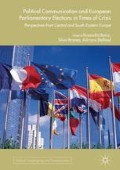Abstract
European Parliament (EP) elections are somehow odd elections. As Michael Marsh and Mark Franklin said several years ago they are ‘neither really European nor proper elections’.1 They are not proper elections because the European Union (EU) executive is not directly affected by the outcome of the European elections in the member countries. This means that EP elections do not initiate a process of government formation as in parliamentary democracies. And they are not European because the electoral competition is not driven by the European agenda.
Access this chapter
Tax calculation will be finalised at checkout
Purchases are for personal use only
Bibliography
De Vries, Catherine E. “Sleeping Giant: Fact or Fairytale? How European Integration Affects National Elections.” European Union Politics, 8(3) (2007): 363–385.
Eijk, Cees van der, Franklin, Mark, and Marsh, Michael. “What Voters Teach Us About Europe-Wide Election, What Europe -Wide Elections Teach Us About Voters”. Electoral Studies, 15 (2) (1996): 149–166.
Gabrižová, Zuzana, Geist, Radovan, “Za Brusel, proti Bruselu, alebo celkom inak? Programy a postoje politických strán pred voľbami do Európskeho parlamentu 2014”. [For Brussels, Against Brussels, or completely differently? Programs and ppositions of political parties before the European Parliament elections 2014]. EurActive, May 2014. http://www.euractiv.sk/fileadmin/user_upload/EP2014_Analyza_FINAL.pdf (accessed 10 June 2015) (2014).
Gabrižová, Zuzana. “The EU in Slovak Political Discourse – the Neglected Battlefield”. International Issues and Slovak Foreign Policy Affairs, 23 (1–2), (2014): 55–70.
Gažík, Peter. “Do Parties Compete about Europe? Party Performance in EP Elections in Slovakia”. Dissertation thesis, manuscript. LSE, London, 2009.
Gyárfášová, Olga. “Medzi spokojnosťou a ľahostajnoťou: Voľby do Európskeho parlamentu 2009 a voliči na Slovensku”. [Between satisfaction and indifference: EP election 2009 and voters in Slovakia]. In Slovensko volí. Európske a prezidentské voľby 2009, edited by Mesežnikov, G. – Gyárfášová, and O. – Kollár M. Bratislava, Inštitút pre verejné otázky [Institute for Public Affairs], 71–80, 2009.
Henderson, Karen. “Europeanization of Political Parties: Redefining Concepts in a United Europ”. Slovak Sociological Review, 41(6), (2009): 526–538.
Malová, Darina, From Listening to Action? New Member States in the European Union (Bratislava: Devin Printing House, 2010).
Mudde, Cas. “EU Accession and a New Populist Center-Periphery Cleavage in Central and Eastern Europe. Center for European Studies. Central Eastern Europe”. Working Paper No. 62 (2004).
Nič, Milan, Slobodník, Marek and Šimečka, Michal. “Slovakia in the EU: An Unexpected Success Story?”. Deutsche Gesellschaft für Auswärtige Politik, e.V., Berlin, Mai 2014, No. 6. http://www.cepolicy.org/sites/cepolicy.org/files/attachments/2014_06_dgapanalyse_slovakia_www_final.pdf (accessed 28 August).
Reif, Karlheinz, and Schmitt, Hermann. “Nine Second-Order National Elections. A Conceptual Framework for the Analysis of European Election Results”. European Journal for Political Research, 8(1), (1980): 3–44.
Author information
Authors and Affiliations
Corresponding author
Editor information
Editors and Affiliations
Copyright information
© 2017 The Author(s)
About this chapter
Cite this chapter
Gyárfášová, O. (2017). The EU Agenda as an Emerging Cleavage of Political Competition? Parties and Their Voters in Slovakia. In: Boicu, R., Branea, S., Stefanel, A. (eds) Political Communication and European Parliamentary Elections in Times of Crisis. Political Campaigning and Communication. Palgrave Macmillan, London. https://doi.org/10.1057/978-1-137-58591-2_11
Download citation
DOI: https://doi.org/10.1057/978-1-137-58591-2_11
Published:
Publisher Name: Palgrave Macmillan, London
Print ISBN: 978-1-137-58590-5
Online ISBN: 978-1-137-58591-2
eBook Packages: Political Science and International StudiesPolitical Science and International Studies (R0)

